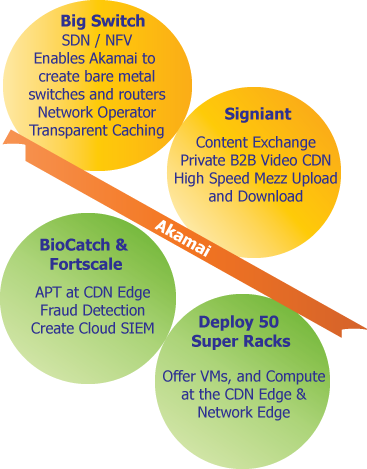Akamai reigns supreme in the CDN Industry. However, in the Cloud, Networking, Security, and Virtualization sectors, Akamai is an afterthought. AWS, Cisco, Palo Alto Networks and VMWare always lead in the conversations, since they are the behemoths of their respective industries. But the day has finally arrived, and these five industries are starting to collapse into each other. Or the other way to look at it, the CDN industry is starting to encroach on the Cloud-compute, Networking, Security and Virtualization industries more than ever.
With that being said, it’s easier for Akamai to cross over into these other four markets than it is for AWS, Cisco, Palo Alto Networks and VMWare to do likewise. CloudFront has had some success in the CDN industry, but is still relatively small compared to Akamai. If Akamai really wanted to, it could inflict considerable damage to AWS/Azure, Cisco/Juniper, Palo Alto Networks, and VMWare in 2015. Akamai’s 161,000+ servers and thousands of global PoPs are not only good for CDN, but they are an extremely valuable asset that can spring to life other businesses including content routing, content switching, compute, security and virtualization.
Akamai, The New Cloud Compute, Storage and CDN Behemoth

First, a few things must happen before Akamai can become a dominant cloud, networking and security provider. Akamai needs Signiant, Big Switch, and Fortscale to make it happen. These companies will help Akamai build out is product portfolio so that its deep in cloud compute, networking, and APT type security. Next, Akamai can add 100 CDN Super Racks (1 rack per PoP) around the globe that gets them into the cloud compute-at-the-edge rental business. Thus, each rack can accommodate about twenty 2U high performance bare metal servers, with two servers in each rack serving as a content router/switch mimicking Comcast. The total compute capacity of 100 Super Racks equates to about 50,000 cores, 8PB of SSD storage, 128PB’s of HD storage, and more bandwidth capacity than any Tier 1 carrier can handle. That’s equates to hundreds of thousands of rentable VMs and millions compute instances. The question is will Akamai do it? Maybe.

